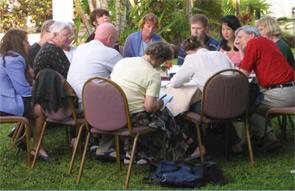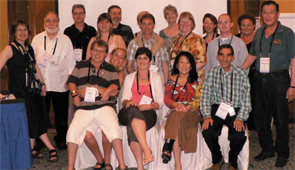OMERACT (Outcome Measures in Rheumatology) has provided a great stimulus to think about the effects of rheumatic diseases on patients and society, and the impact of their treatment.1 It all started in 1992, with the development of a core set of outcome measures for rheumatoid arthritis (RA). Officially, these measures are termed the World Health Organization and International League of Associations for Rheumatology core endpoints for symptom-modifying antirheumatic drugs in rheumatoid arthritis clinical trials, but they are the product of OMERACT.2 This first OMERACT conference in which I participated brought together 92 rheumatologists, methodologists, drug regulatory officials, and pharmaceutical physicians from all over the world. We were pleased—and rightly so—that we had been able to achieve an international and multidisciplinary consensus statement that was subsequently endorsed by both ACR and the European League Against Rheumatism. However, it took us 10 years to discover that there was something missing—the patients’ perspective.
OMERACT 6, in 2002, was the first time patients participated. The 11 patients (see Figure 1) all had RA, came from seven countries, and contributed principally to discussions on “minimally clinically important changes” in relation to the core set. However, the patients also joined many of the other conference sessions and workshops. The conference report states that, “A number of subjective experiences of RA are not encompassed within the current core set of outcome measures, but were identified by patients as important consequences of their disease. These include a sense of well-being, fatigue, and disturbed sleep, but further work is required to develop and explore this list, and to develop valid measurement instruments.”3 Further work was indeed undertaken. The findings were published and the issues considered at subsequent OMERACT meetings. In the end, 16 years after its first agreement, OMERACT decided that the RA core set should include fatigue in future studies.4 It has not stopped there. The pressure is on to consider treatment outcomes in the wider context of life impact measures, clearly the perspective relevant to patients.5

A Necessary Perspective
These days, OMERACT without patients would be like a coach without horses or a bride without a groom. And the patients are not just nominal participants, there to look good and make up the numbers. Patients have guaranteed places at OMERACT meetings, take a full part in all the activities (including facilitating group sessions, reporting back to plenary sessions, and writing the published conference reports), have been included in many OMERACT working groups, and have their own working committee. They all liaise closely with the two executive members (Laure Gossec and myself) who are responsible for ensuring the patient perspective is included in OMERACT activities. Support for patient participants is provided through funding to attend OMERACT conferences, special introductory and update sessions at the conference, support to join in local working group activities, the provision of a patient glossary, and regular email updates.1 At the last OMERACT conference there were 21 patient partners comprising 10% of the participants (see Figure 2).

These OMERACT patient research partners have been identified by their personal rheumatologists as people who could make a contribution to the OMERACT process of data-driven debate and consensus building. Although many have technical skills, such as mentorship or statistics, the real added value they bring is their personal experience of having lived with their condition. Readers of this article who are living with their own medical condition will readily understand that no amount of theoretical knowledge can replace the special perspective that a patient brings. To capture this perspective and include it in their work, researchers face two new challenges: how to identify, recruit, and support patient research partners; and how to listen to what they are saying and recognize when it widens and deepens our understanding of an issue. A group of OMERACT patients and researchers have published an account of the lessons learned from our endeavors, and one patient partner is currently undertaking a PhD, studying the personal and organizational adjustments that have been integral to the process.6
Where next with patient participation? OMERACT recently adopted the policy that patients should be involved in all working groups in one way or another. For some, such as technical groups looking at MRI sequences or biomarker requirements, this involvement will occur principally at the OMERACT biannual meetings. But, for most groups, such as my own working group on outcomes for polymyalgia rheumatica (PMR), we expect patients to participate at every stage and at every level. For the PMR Working Group, the first presentation at the initial meeting was from a patient, and the first piece of work was a consultation exercise with over 100 patients at five centers in Europe to discover the outcomes of importance to patients themselves. The OMERACT Filter, the book of rules that explains how relevant outcome measures should be chosen and measured, is currently under review, and an updated Filter will be proposed at the next OMERACT conference.7 One major development will be the explicit instructions on the inclusion of the patient perspective for all future OMERACT core sets.
Dr. Kirwan is professor of rheumatic diseases at the University of Bristol, Bristol, United Kingdom. He is also the OMERACT patient perspective coordinator.
References
- Outcome Measures in Rheumatology. www.omeract.org. Accessed September 6, 2011.
- Boers M, Tugwell P, Felson DT, et al. World Health Organisation (WHO) and International League Against Rheumatism (ILAR) core endpoints for symptom-modifying antirheumatic drugs in rheumatoid arthritis clinical trials. J Rheumatol. 1994;21:86-89.
- Kirwan J, Heiberg T, Hewlett S, et al. Outcomes from the Patient Perspective workshop at OMERACT 6. J Rheumatol. 2003;30:868-872.
- Kirwan J, Minnock P, Adebajo A, et al. Patient Perspective Workshop: Fatigue as a recommended patient-centred outcome measure in rheumatoid arthritis. J Rheumatol. 2007;34:1174-1177.
- Kirwan J, Newman S, Tugwell P, et al. Progress on incorporating the patient perspective in outcome assessment in rheumatology and the emergence of Life Impact Measures at OMERACT 9. J Rheumatol. 2009;36:2071-2076.
- Hewlett S, Wit M, Richards P, et al. Patients and professionals as research partners: Challenges, practicalities and benefits. Arthritis Rheum. 2006;55:676-680.
- Boers M, Brooks P, Strand CV, Tugwell P. The OMERACT Filter for outcome reasures in Rheumatology. J Rheumatol. 1998;25:198-199.

